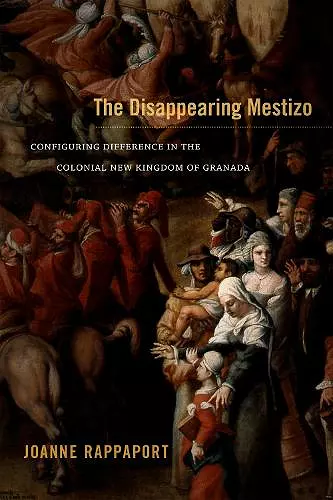The Disappearing Mestizo
Configuring Difference in the Colonial New Kingdom of Granada
Format:Paperback
Publisher:Duke University Press
Published:4th Apr '14
Currently unavailable, and unfortunately no date known when it will be back

Much of the scholarship on difference in colonial Spanish America has been based on the "racial" categorizations of indigeneity, Africanness, and the eighteenth-century Mexican castas system. Adopting an alternative approach to the question of difference, Joanne Rappaport examines what it meant to be mestizo (of mixed parentage) in the early colonial era. She draws on lively vignettes culled from the sixteenth- and seventeenth-century archives of the New Kingdom of Granada (modern-day Colombia) to show that individuals classified as "mixed" were not members of coherent sociological groups. Rather, they slipped in and out of the mestizo category. Sometimes they were identified as mestizos, sometimes as Indians or Spaniards. In other instances, they identified themselves by attributes such as their status, the language that they spoke, or the place where they lived. The Disappearing Mestizo suggests that processes of identification in early colonial Spanish America were fluid and rooted in an epistemology entirely distinct from modern racial discourses.
"Corrects simplistic ideas about the timelessness of racial categorization, even including previous efforts to historicize the alleged 'hardening' of race designations in the eighteenth century." -- Nicole Von Germeten * Journal of American History *
“Rappaport’s revisionist study is deeply engaged with current scholarship and is especially interested in targeting much of the literature on New Spain, where a lion’s share of work on casta has focused. … Some may hesitate to accept the book’s most ambitious claims based on its admittedly small but expertly reconstructed set of vignettes. This well-crafted book, however, raises a host of critical conceptual and methodological matters that merit the attention of all scholars of identity and difference in early Spanish America.” -- Andrew B. Fisher * Hispanic American Historical Review *
“Rappaport’s revisionist study is deeply engaged with current scholarship and is especially interested in targeting much of the literature on New Spain, where a lion’s share of work on casta has focused. … Some may hesitate to accept the book’s most ambitious claims based on its admittedly small but expertly reconstructed set of vignettes. This well-crafted book, however, raises a host of critical conceptual and methodological matters that merit the attention of all scholars of identity and difference in early Spanish America.” -- Andrew B. Fisher * Hispanic American Historical Review *
"The Disappearing Mestizo is a pathbreaking study of race mixture in the New Kingdom of Granada (present-day Colombia) in the 16th and 17th centuries. Unlike most historians of race in the Spanish colonial world, Joanne Rappaport eschews any characterization of mixed-race populations as discrete social groups. Instead, she explores the practices by which individuals of mixed Spanish, indigenous, and African descent (or an admixture of these) were named as mestizo or mulatto by others or by themselves." -- Paul K. Eiss * American Anthropologist *
"Rappaport introduces her readers to a lively cast of ethnographically constructed characters who effectively force our thinking beyond racial categories of difference and toward a deeper understanding of the cultural milieu that dictated why people did or did not use so-called caste designations when describing themselves and others." -- Andrew J. Rosa * Journal of Anthropological Research *
"The author of this excellent book makes a provocative and important contribution to the literature on the operation and even existence of 'race' in colonial Latin America.... Rappaport delves deeper than others into the fluid, situational practices of identification and deconstructs more thoroughly than others the 'system' of castas." -- Peter Wade * The Historian *
"Rappaport’s engaging vignettes, which animate individual lives while probing their broader meaning, and her conversational style, which guides readers through her interpretive method, will make The Disappearing Mestizo appealing to students and scholars alike." -- Yanna Yannakakis * EIAL *
"Rappaport exemplifies a detailed ethnography, attention to nuance, and an excellent grasp of both the scholarship on the subject and the difficult theoretical underpinnings to the study of such slippery concepts as race.... [N]ot only does this book make crucial contributions to the history of categorization in colonial Latin America but it also provides new avenues and insights for the exploration of racialization and labeling elsewhere. This is an accomplished and significant work that will resonate greatly." -- Cristian Berco * Canadian Journal of History *
ISBN: 9780822356363
Dimensions: unknown
Weight: 490g
368 pages